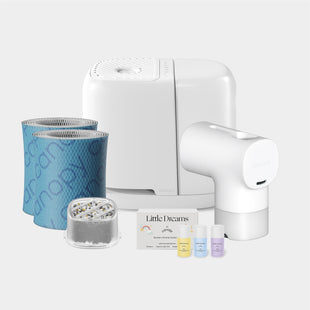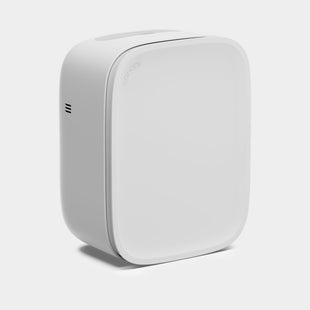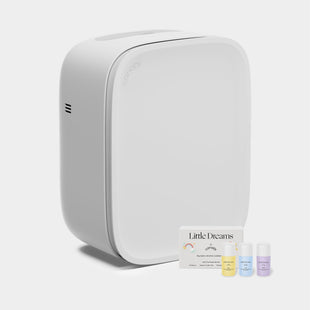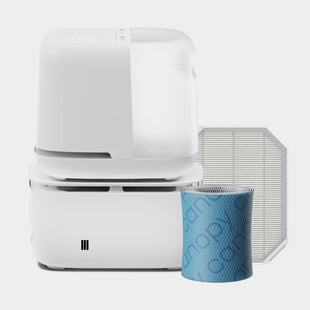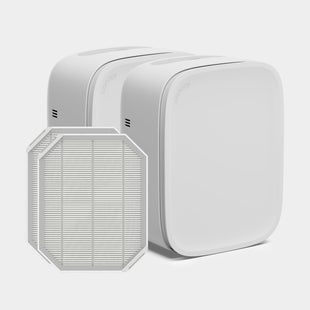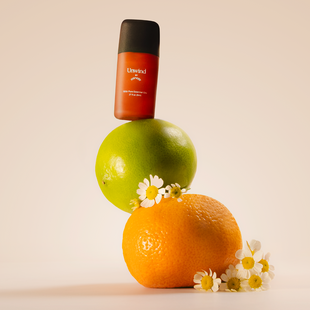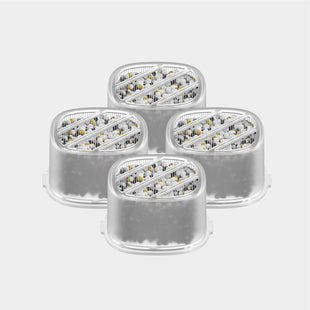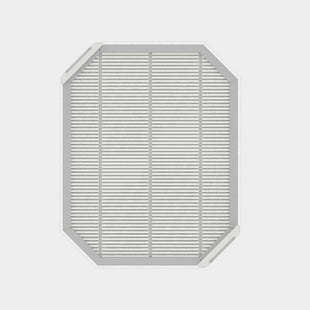This content has been reviewed and updated on June 22, 2023.
According to the CDC, asthma affects nearly 26 million Americans. This condition is characterized by inflammation of the airways and excess mucus in the nose and throat, which can cause wheezing, coughing, chest pain, and trouble breathing. A person’s genetics and environment contribute to the frequency of flare-ups, and exercise, respiratory infections, stress, and carrying excess weight can also trigger individual reactions.
If you or someone in your family has asthma, it’s important to understand why flare-ups happen more often during certain times of the year and how a humidifier can help.
How the Environment Contributes to Asthma Symptoms
Do you experience chest pain in winter or coughing fits during spring and summer? Exposure to different seasonal irritants can trigger or exacerbate asthma symptoms.
Spring & Fall
During spring, the warm weather causes plants to awaken and prepare for their reproductive cycle. If you’re sensitive to tree and grass pollen, you most likely experience asthma symptoms throughout the season. The powdery substance becomes airborne, and breathing it in irritates the lungs.
Ragweed pollen is a seasonal concern throughout the country—this plant grows in every state but Alaska—and it has a long season. Ragweed season can start as early as July and stretch through November, with most areas peaking in September.
Rain causes pollen granules to break apart, which can make air quality even worse during seasonal storms.
Summer
Dry soil and plants, scorching heat, drought conditions, and windy weather are a dangerous combination during summer, even in areas that only experience wildfires indirectly. Wildfire smoke pollutes the air and can trigger asthma symptoms. It contains carbon monoxide, nitrogen dioxide, volatile organic compounds, and other irritants.
Even a properly tended campfire or barbecue can set off an asthmatic reaction because the smoke contains particulate matter that can cause airway irritation.
Winter
Cold air holds less moisture than warm air, which is why winter is a dry season. The dry air absorbs moisture from your body, which causes itchy skin, irritated eyes, nosebleeds, and a sore throat. Breathing in dry air causes the airways to convulse and the lungs to tighten, which can prompt an asthma attack.
Does a Humidifier Help with Asthma?

To limit your exposure to asthma triggers, check the local weather report before going outside. Stay indoors with the windows closed when pollen counts and the air quality index are high.
It’s a good idea to speak to your doctor about other ways you can manage asthma symptoms. Your physician might recommend placing a humidifier in a part of your home with the most airflow. This could be a space between windows or between a window and an exterior door. A humidifier releases moisture into the air to raise relative humidity levels. Although this won’t treat asthma, it can provide relief.
What Is the Ideal Home Humidity for People With Asthma?
Humidity between 0 and 30% can cause dry or itchy skin, nosebleeds, and dry nasal passageways and increase your chances of contracting a respiratory infection. Humidity between 60% and 100% is uncomfortably humid. When your environment is too humid, the body has a difficult time cooling down, mold and bacteria flourish, and you might find it difficult to breathe.
The optimal home humidity level for people with asthma is between 30% and 50%. A humidifier can be particularly helpful in the fall and winter months when winds pick up and extremely cold weather reduces the moisture levels in the air. Running a humidifier increases air moisture to reduce congestion, soothe a dry throat, and ease coughing. Humidifiers also help relieve cold and flu symptoms, which generally exacerbate asthma attacks.
What Are the Best Humidifiers for Asthma?
 A humidifier should ease your asthma symptoms, not make them worse, so choose a device with a disposable paper filter to keep the hydrated air clean. This type of filter absorbs water and allows it to evaporate slowly—and it traps any contaminants inside the humidifier instead of circulating in the air.
A humidifier should ease your asthma symptoms, not make them worse, so choose a device with a disposable paper filter to keep the hydrated air clean. This type of filter absorbs water and allows it to evaporate slowly—and it traps any contaminants inside the humidifier instead of circulating in the air.Cleaning the device regularly prevents dust mites, mold, pollen, bacteria, and other asthma-inducing allergens from accumulating, polluting the air, and irritating airways. You want this process to be as simple as possible, so look for a unit with dishwasher-safe components.
Asthma flares can happen at night if your sleep position puts pressure on your chest. Dust mites and other allergens in your bedroom can also trigger a reaction. Additionally, sleep causes epinephrine levels to decline. Epinephrine is a hormone that keeps airways relaxed and open, which means producing less can make it harder to breathe.
The good news is that it’s safe to run a humidifier overnight, especially if the device has a large tank and a long running time. It can provide continuous hydration to ease asthma symptoms day and night. Humidifiers that have smart sensors will run until the interior is dry, which can also inhibit mold growth.
Cool mist humidifiers are the safest option in homes with pets and children since they don’t produce any heat. The cool mist helps shrink nasal passages to soothe sinuses and makes it easier to breathe to reduce the risk of respiratory distress.
To take control of your asthma, use an easy-to-clean Canopy humidifier to adjust relative humidity levels inside your home. With a 2.5-liter tank, the original humidifier provides up to 36 hours of continuous hydration in up to 500 square feet of space. The Humidifier Plus contains a 5.5-liter tank, for up to 36 hours of hydration in up to 1,000 square feet of space.
To keep hydrated air clean, the filter should be replaced every six weeks. Canopy offers one, two, and three replacement filter subscriptions. The disposable paper filters ship every 45 to 135 days, depending on the subscription.
Asthma can flare up any time of year, so count on Canopy for clean, soothing hydration that helps you breathe comfortably.









